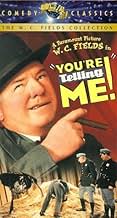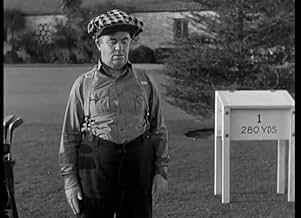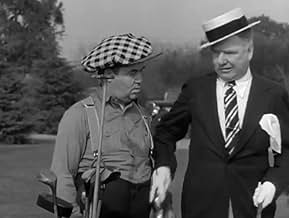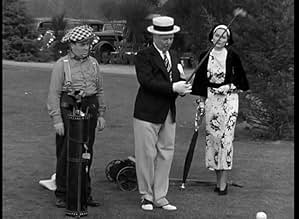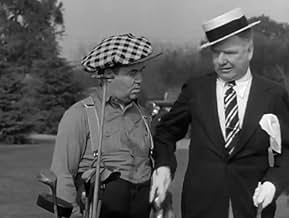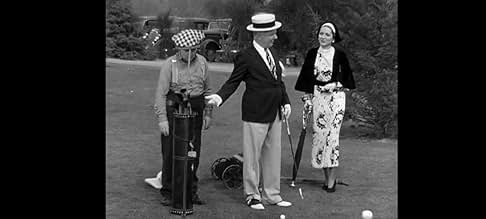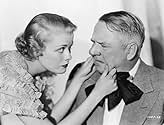VALUTAZIONE IMDb
7,4/10
1241
LA TUA VALUTAZIONE
Aggiungi una trama nella tua linguaA hard-drinking, socially-awkward inventor wrecks his daughter's chances of marriage into a rich family and bungles his own chances of success by selling one of his more practical inventions... Leggi tuttoA hard-drinking, socially-awkward inventor wrecks his daughter's chances of marriage into a rich family and bungles his own chances of success by selling one of his more practical inventions.A hard-drinking, socially-awkward inventor wrecks his daughter's chances of marriage into a rich family and bungles his own chances of success by selling one of his more practical inventions.
- Regia
- Sceneggiatura
- Star
- Premi
- 1 vittoria in totale
Buster Crabbe
- Bob Murchison
- (as Larry 'Buster' Crabbe)
Dell Henderson
- Mayor
- (as Del Henderson)
Robert McKenzie
- Charlie Bogle
- (as Robert Mc Kenzie)
William Bailey
- Tire Company Executive
- (non citato nei titoli originali)
Eddie Baker
- First Motorcycle Cop
- (non citato nei titoli originali)
Dorothy Bay
- Mrs. Kendall
- (non citato nei titoli originali)
Harold Berquist
- Doorman
- (non citato nei titoli originali)
Don Brodie
- Waiter
- (non citato nei titoli originali)
Elise Cavanna
- Sarah Smith - Female Gossip
- (non citato nei titoli originali)
Recensioni in evidenza
Well, what did W.C. Fields ever do that was bad? Even in lesser works, he's still at least interesting to watch. You're Telling Me is his second or third best of all those I've seen. The opening sequence, the suicide sequence, and the ostrich sequence are its highlights. The golf sequence might be counted, too, but, if you've seen the short film The Golf Specialist, the one in You're Telling Me is less perfect. For one thing, Fields plays one of his nicer characters in this one. He's rather good on the dramatic side, actually. I liked the scene where he tries to convince the princess not to kill herself very much. Fields showed some true range there. Anyway, as most Fields fans know, the Great Man had two basic characters: the hen-pecked husband and the flim-flam man. In The Golf Specialist, Fields is a flim-flam man, and he needs to be quite mean-spirited to play that role. The nice character from You're Telling Me seems out of place being cruel to the caddy, no matter if the caddy deserves it or not. Also, the caddy and the woman watching Fields were much funnier in the short film than in here. I suppose if I hadn't have seen The Golf Specialist just recently, the golf sequence in You're Telling Me would have seemed a lot better. Still, the film is certainly worth a 9/10. See it if you get the chance.
10Tashtago
It's amazing how much got squeezed into this 66 minute film. "You're Telling Me" contains some of Fields best work. The golf routine at the end is classic, although a little shorter than in the previously filmed "the Golf Specialist" which features a different and even more revolting caddy. What I noticed on seeing this film again after many years is what a good actor Fields is, especially in the scene where he talks the princess out of suicide. The supporting cast is also very good especially the aforementioned Kathleen Howard. No other comedian could get away with the scene where Fields knocks himself out with one of his inventions and two scenes later is still unconscious. As a Fields fan this a 10. Favorite line: "Your alright Mayor, I voted for you in the last election...five times."
Does anyone out there know where I can find a copy of "Man on the Flying Trapeze" ? Any information is much appreciated.
Does anyone out there know where I can find a copy of "Man on the Flying Trapeze" ? Any information is much appreciated.
In the few W. C. Fields movies that I've seen, he doesn't disappoint. I can now add to that "You're Telling Me!", wherein he plays an optometrist-inventor whose daughter's marriage plans get complicated by her fiance's mother's snobbish attitude. The protagonist's attempt to show his latest invention to some execs further complicates things. More zaniness follows.
It's not any sort of profound movie, and doesn't try to be. It's just funny. Fields, despite his personal problems, always managed to be entertaining. You're sure to like this one.
It's not any sort of profound movie, and doesn't try to be. It's just funny. Fields, despite his personal problems, always managed to be entertaining. You're sure to like this one.
This is yet another delightful W.C. Fields vehicle which he had already made as a Silent, under the name SO'S YOUR OLD MAN (1926). Actually, the first half of this comedy classic is possibly the best of the four titles I've watched so far from Universal's second Fields set (with several hilarious gags taken by the star as far as they can go); the latter section lacks that initial sparkle, despite its climaxing with his famous golf routine (which had also been the basis of his short THE GOLF SPECIALIST [1930]).
Interestingly, the film combines the star's two basic personality traits: here, he's both henpecked and con-man (playing an inventor of unlikely gadgets). There's the usual romance hindered by class distinction (see also THE OLD FASHIONED WAY [1934]) between Fields' livelier-than-usual daughter - played by Joan Marsh - and future Flash Gordon Larry "Buster" Crabbe; lovely Adrienne Ames brings an exotic touch to the proceedings as a princess who befriends the star on a train (gossiping womenfolk from Fields' hometown think he's having an affair) and determines to 'elevate' his social position. The train sequence is marked by an unexpected poignancy, with the Fields character's intention of committing suicide after blowing his get-rich-quick scheme.
Among the highlights are: Fields ruining his daughter's prospects by his "naïve gauchery" when Crabbe's snobbish upper-crust mother comes visiting; his demonstration of the damage-proof tyre (Fields doesn't realize that his vehicle has been moved and that he's firing at the wheels of a police-car - the scene is capped by the car-radio's announcement of the very 'crime' being committed upon it!); Fields inadvertently drinking from a roach exterminating potion of his own invention but, after turning to the genuine stuff, decides that the former is more to his liking!; when he returns home a failure, Fields tries to soften the blow to his family honor by buying his wife a pet - a large ostrich he's unable to control and ends up losing practically immediately! And the best lines: the "Mrs. Bisbee, you're the luckiest woman in the world" - "Is my husband dead?" exchange between the princess and Fields' wife; the star's remark to the princess about Mrs. Bisbee's "uncalled for sarcasm".
Director Kenton is better known for his horror stuff, notably ISLAND OF LOST SOULS (1933) - also made at Paramount - and such Universal 'B' monster flicks as THE GHOST OF FRANKENSTEIN (1942), HOUSE OF FRANKENSTEIN (1944) and HOUSE OF Dracula (1945); he did, however, helm three above-average Abbott & Costello comedies a decade after making his solo W.C. Fields vehicle.
In conclusion, even if Fields was essentially a Talkie comedian, I still wish that some of the earlier versions of his classic films were more readily available (I'm only familiar with the star's Silent work through his debut short POOL SHARKS [1915], featured on Criterion's W.C. FIELDS: 6 SHORT FILMS disc)...
Interestingly, the film combines the star's two basic personality traits: here, he's both henpecked and con-man (playing an inventor of unlikely gadgets). There's the usual romance hindered by class distinction (see also THE OLD FASHIONED WAY [1934]) between Fields' livelier-than-usual daughter - played by Joan Marsh - and future Flash Gordon Larry "Buster" Crabbe; lovely Adrienne Ames brings an exotic touch to the proceedings as a princess who befriends the star on a train (gossiping womenfolk from Fields' hometown think he's having an affair) and determines to 'elevate' his social position. The train sequence is marked by an unexpected poignancy, with the Fields character's intention of committing suicide after blowing his get-rich-quick scheme.
Among the highlights are: Fields ruining his daughter's prospects by his "naïve gauchery" when Crabbe's snobbish upper-crust mother comes visiting; his demonstration of the damage-proof tyre (Fields doesn't realize that his vehicle has been moved and that he's firing at the wheels of a police-car - the scene is capped by the car-radio's announcement of the very 'crime' being committed upon it!); Fields inadvertently drinking from a roach exterminating potion of his own invention but, after turning to the genuine stuff, decides that the former is more to his liking!; when he returns home a failure, Fields tries to soften the blow to his family honor by buying his wife a pet - a large ostrich he's unable to control and ends up losing practically immediately! And the best lines: the "Mrs. Bisbee, you're the luckiest woman in the world" - "Is my husband dead?" exchange between the princess and Fields' wife; the star's remark to the princess about Mrs. Bisbee's "uncalled for sarcasm".
Director Kenton is better known for his horror stuff, notably ISLAND OF LOST SOULS (1933) - also made at Paramount - and such Universal 'B' monster flicks as THE GHOST OF FRANKENSTEIN (1942), HOUSE OF FRANKENSTEIN (1944) and HOUSE OF Dracula (1945); he did, however, helm three above-average Abbott & Costello comedies a decade after making his solo W.C. Fields vehicle.
In conclusion, even if Fields was essentially a Talkie comedian, I still wish that some of the earlier versions of his classic films were more readily available (I'm only familiar with the star's Silent work through his debut short POOL SHARKS [1915], featured on Criterion's W.C. FIELDS: 6 SHORT FILMS disc)...
YOU'RE TELLING ME? (Paramount, 1934), directed by Erle C. Kenton, adapted from the story "Mr. Bisbee's Princess" by Julian Street, stars W.C Fields in his first domestic comedy since his silent comedy days of the late 1920s, reprising the character he originated from SO'S YOUR OLD MAN (Paramount, 1926). In spite of some script alterations, ranging from the invention of unbreakable glass to punctured proof tires, the basic premise remains the same. As in most comedies displaying Fields the family man, he's a lovable father worshiped by an offspring, in many instances, his daughter, looked upon by his spouse as a miserable failure, until success comes his way for his wife to have a new outlook on him. While she may still appear to have lost interest in him, she hasn't lost her pride by elevating herself to the level of her husband's rewarded success.
For the basic plot: Samuel Bisbee (WC Fields) lives in a small town of Crystal Springs. He supports his wife, Abigail, (Louise Carter), formerly Abigail Warren of the acclaimed Warrens of Virginia, and daughter, Pauline (Joan Marsh). Sam is an optometrist who spends most of his time working on several inventions at the shop. In between his intervals, he gets together with the neighboring husbands enjoying themselves drinking liquor. Aside from domestic problems involving Pauline's love for Bob Murchinson (Larry "Buster" Crabbe), son of society snob, Mrs. Edward Quimby Murchinson (Kathleen Howard), who disapproves of their relationship, especially after meeting her father. As everything seems to fail, Bisbee gets a registered letter from the National Tire Company asking for a demonstration of his latest invention, a punctured-proof tire. Things go wrong when his automobile, equipped with the punctured proof tires, parked in a non-parking zone to be towed during Bisbee's absence and substituted by the same make and model police car. Bisbee demonstrates the puncture proof tire to Mr. Robbins (George Irving) by shooting at them, only to witness tires going flat one at a time. Foiled again, Sam takes the next train home. Depressed, he decides to commit suicide, leaving his wife a note before swallowing some iodine, but instead, mistakes a woman passenger (Adrienne Ames) with a bottle of iodine with intentions of doing the same thing, thus "saving her life." Unaware that she's the famed Princess Lescaboura traveling incognito, he befriends her in her cabin, telling her his life story. Seen together by town gossips, rumor spreads about Bisbee's secret rendezvous on the train with an attractive woman. Finding Bisbee in need of encouragement, the princess helps him by coming to Crystal Springs, surprising, in fact, shocking the people of her sole purpose being to visit her "good friend," Samuel Bisbee, the one who "saved her life in the war."
A domestic comedy with its ups and downs, is definitely a WC Fields showcase from his unsuccessful to successful inventions; attempt to make up with his wife a giant Ostrich as a gift; to his climatic golf game lifted from one of Fields' many comic supplements originated on the stage, and duplicated in his comedy short, THE GOLF SPECIALIST (1930), this time with Tammany Young as the caddy stooge.
Kathleen Howard, famous for pairing as Fields' shrewish wife in both IT'S A GIFT (1934) and THE MAN OF THE FLYING TRAPEZE (1935), makes her initial appearance with him here. Louise Carter, a physically fragile looking woman, as the domineering wife, shows her lack of love for her husband when in one instant, is told by the visiting Princess, "I think you're the luckiest woman in the world." Mrs. Bisbee asks, "Is my husband dead?" "Buster" Crabbe, the famed swimming champion who scored success as Kaspa, the lion man, in KING OF THE JUNGLE (Paramount, 1933), and the chaptered serial, TARZAN THE FEARLESS (1933), ranks one of the stronger supporting names ever credited in a Fields comedy, yet his secondary role, gives him little to do, especially during the climatic golf game sequence where all he does is look on approvingly and smile. Joan Marsh as Bisbee's daughter, with hairstyle and features resembling Mary Carlisle, another Paramount starlet, has her limitations as well. Adrienne Ames as the princess, addressed as "Marie" by Bisbee, comes off better, as the sympathetic character who helps Sam Bisbee regain his confidence and respect from his family and townspeople. She's the one who uses the titled catch phrase, "You're telling me?"
YOU'RE TELLING ME? is a sort after Fields comedy. Once unavailable for viewing, it finally surfaced on commercial television in the late 1970s, which, by then, was a totally unfamiliar Fields comedy. Prior to that, when TV Guide had the title "You're Telling Me" listed, it turned out to be not the Fields edition but a Universal 1942 comedy bearing the same title starring Hugh Herbert. The Fields edition gained its recognition when presented, along with other Fields/ Paramount comedies, on American Movie Classics (1992-93). Out of circulation for nearly a decade, YOU'RE TELLING ME?, which has since been distributed on video cassette, received some further exposure on Turner Classic Movies (2001-2002).
As with themes to many Frank Capra comedies about the common man, "No man is a failure ... when he has friends," this goes for Samuel Bisbee who finds the true friendship with Princess Lescaboura, proving to him that he, in true essence, is not a failure at all. YOU'RE TELLING ME? is an enjoyable 66 minutes,not only displaying Fields' comedic talents as inventor who's no Thomas Edison, but a family man with a sympathetic nature, even when sneaking in drink or two. You're telling me? (**1/2)
For the basic plot: Samuel Bisbee (WC Fields) lives in a small town of Crystal Springs. He supports his wife, Abigail, (Louise Carter), formerly Abigail Warren of the acclaimed Warrens of Virginia, and daughter, Pauline (Joan Marsh). Sam is an optometrist who spends most of his time working on several inventions at the shop. In between his intervals, he gets together with the neighboring husbands enjoying themselves drinking liquor. Aside from domestic problems involving Pauline's love for Bob Murchinson (Larry "Buster" Crabbe), son of society snob, Mrs. Edward Quimby Murchinson (Kathleen Howard), who disapproves of their relationship, especially after meeting her father. As everything seems to fail, Bisbee gets a registered letter from the National Tire Company asking for a demonstration of his latest invention, a punctured-proof tire. Things go wrong when his automobile, equipped with the punctured proof tires, parked in a non-parking zone to be towed during Bisbee's absence and substituted by the same make and model police car. Bisbee demonstrates the puncture proof tire to Mr. Robbins (George Irving) by shooting at them, only to witness tires going flat one at a time. Foiled again, Sam takes the next train home. Depressed, he decides to commit suicide, leaving his wife a note before swallowing some iodine, but instead, mistakes a woman passenger (Adrienne Ames) with a bottle of iodine with intentions of doing the same thing, thus "saving her life." Unaware that she's the famed Princess Lescaboura traveling incognito, he befriends her in her cabin, telling her his life story. Seen together by town gossips, rumor spreads about Bisbee's secret rendezvous on the train with an attractive woman. Finding Bisbee in need of encouragement, the princess helps him by coming to Crystal Springs, surprising, in fact, shocking the people of her sole purpose being to visit her "good friend," Samuel Bisbee, the one who "saved her life in the war."
A domestic comedy with its ups and downs, is definitely a WC Fields showcase from his unsuccessful to successful inventions; attempt to make up with his wife a giant Ostrich as a gift; to his climatic golf game lifted from one of Fields' many comic supplements originated on the stage, and duplicated in his comedy short, THE GOLF SPECIALIST (1930), this time with Tammany Young as the caddy stooge.
Kathleen Howard, famous for pairing as Fields' shrewish wife in both IT'S A GIFT (1934) and THE MAN OF THE FLYING TRAPEZE (1935), makes her initial appearance with him here. Louise Carter, a physically fragile looking woman, as the domineering wife, shows her lack of love for her husband when in one instant, is told by the visiting Princess, "I think you're the luckiest woman in the world." Mrs. Bisbee asks, "Is my husband dead?" "Buster" Crabbe, the famed swimming champion who scored success as Kaspa, the lion man, in KING OF THE JUNGLE (Paramount, 1933), and the chaptered serial, TARZAN THE FEARLESS (1933), ranks one of the stronger supporting names ever credited in a Fields comedy, yet his secondary role, gives him little to do, especially during the climatic golf game sequence where all he does is look on approvingly and smile. Joan Marsh as Bisbee's daughter, with hairstyle and features resembling Mary Carlisle, another Paramount starlet, has her limitations as well. Adrienne Ames as the princess, addressed as "Marie" by Bisbee, comes off better, as the sympathetic character who helps Sam Bisbee regain his confidence and respect from his family and townspeople. She's the one who uses the titled catch phrase, "You're telling me?"
YOU'RE TELLING ME? is a sort after Fields comedy. Once unavailable for viewing, it finally surfaced on commercial television in the late 1970s, which, by then, was a totally unfamiliar Fields comedy. Prior to that, when TV Guide had the title "You're Telling Me" listed, it turned out to be not the Fields edition but a Universal 1942 comedy bearing the same title starring Hugh Herbert. The Fields edition gained its recognition when presented, along with other Fields/ Paramount comedies, on American Movie Classics (1992-93). Out of circulation for nearly a decade, YOU'RE TELLING ME?, which has since been distributed on video cassette, received some further exposure on Turner Classic Movies (2001-2002).
As with themes to many Frank Capra comedies about the common man, "No man is a failure ... when he has friends," this goes for Samuel Bisbee who finds the true friendship with Princess Lescaboura, proving to him that he, in true essence, is not a failure at all. YOU'RE TELLING ME? is an enjoyable 66 minutes,not only displaying Fields' comedic talents as inventor who's no Thomas Edison, but a family man with a sympathetic nature, even when sneaking in drink or two. You're telling me? (**1/2)
Lo sapevi?
- QuizFields' character Bisbee describes a possible scenario involving catching burglars in the basement and drinking with them, a scenario that would be played out in a later film, Man on the Flying Trapeze (1935).
- BlooperRosita is brushing Princess Lescaboura's nails and after Rosita says, "But you must.", the Princess' hands are under the table.
- Citazioni
Sam Bisbee: It's a funny ol' world... Man's lucky if he gets out of it alive.
- ConnessioniReferences Lo sceicco (1921)
I più visti
Accedi per valutare e creare un elenco di titoli salvati per ottenere consigli personalizzati
- How long is You're Telling Me!?Powered by Alexa
Dettagli
- Tempo di esecuzione1 ora 6 minuti
- Colore
- Proporzioni
- 1.37 : 1
Contribuisci a questa pagina
Suggerisci una modifica o aggiungi i contenuti mancanti

Divario superiore
By what name was You're Telling Me! (1934) officially released in Canada in English?
Rispondi
